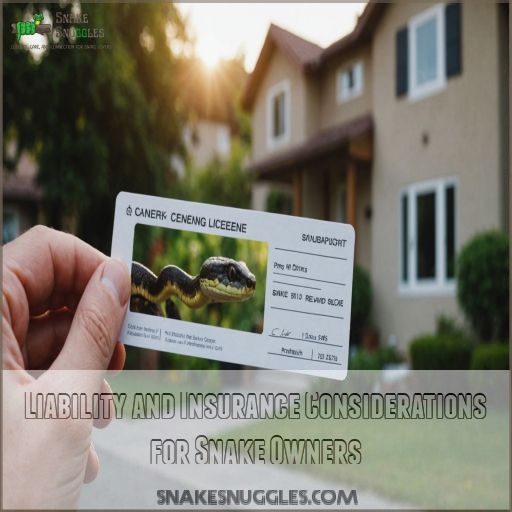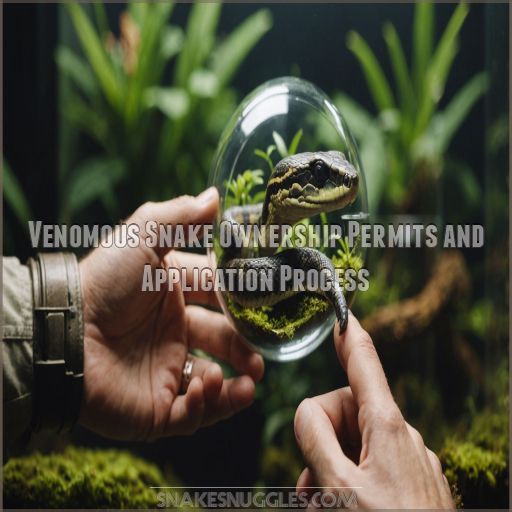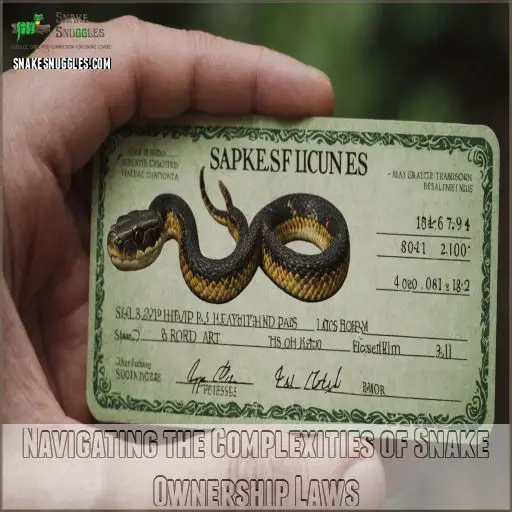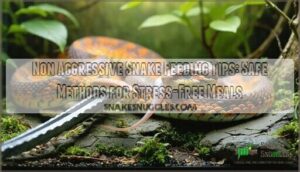This site is supported by our readers. We may earn a commission, at no cost to you, if you purchase through links.
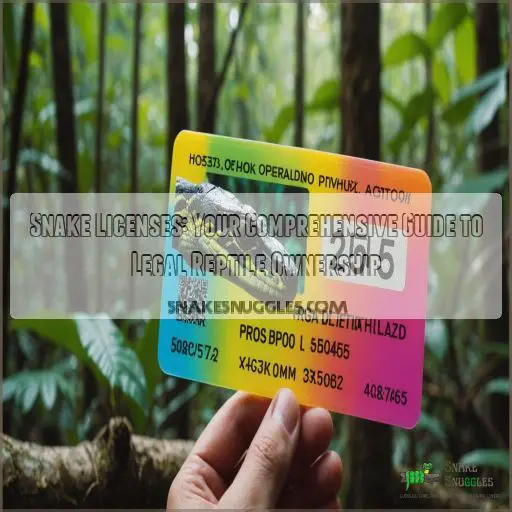 You don’t usually need a "snake license" to own the common pet snakes like corn snakes or ball pythons – they’re not venomous, so no special permits required.
You don’t usually need a "snake license" to own the common pet snakes like corn snakes or ball pythons – they’re not venomous, so no special permits required.
But if you want to keep a venomous snake, that’s a different story.
Most states require you to get a permit, prove you have the right expertise and experience, and meet strict safety requirements.
The process can be a real headache, but it’s essential to stay on the right side of the law. Venomous snake ownership isn’t a casual hobby – it’s a big responsibility.
If you’re up for the challenge, do your research and get the proper licenses. It’ll save you a lot of legal trouble down the road.
Table Of Contents
- Key Takeaways
- Understanding Venomous Snake Ownership Laws in the United States
- Navigating the Legalities of Owning Non-Venomous Snakes
- Liability and Insurance Considerations for Snake Owners
- Venomous Snake Ownership Permits and Application Process
- Navigating the Complexities of Snake Ownership Laws
- Frequently Asked Questions (FAQs)
- What are the costs associated with snake ownership licenses?
- How often do snake ownership licenses need to be renewed?
- What documentation is required for obtaining a venomous snake license?
- Can I own a venomous snake without a license in an emergency situation?
- What happens if I move to a new state with my snake?
- Conclusion
Key Takeaways
- Owning venomous snakes requires navigating a complex web of federal, state, and local laws – you’ll need the right licenses, permits, and safety protocols to stay on the right side of the law.
- Even with non-venomous snakes, you often need permits and need to understand the differences between owning native vs. non-native species – don’t get tripped up by the legalities.
- Be prepared to pay those pesky permit fees, renew licenses regularly, and fulfill reporting obligations – it’s a commitment, but worth it to responsibly own your scaly companions.
- Consult your state’s wildlife agency and legal experts to decode the latest snake ownership regulations – they’re your best allies in staying compliant and avoiding hefty fines or losing your pets.
Understanding Venomous Snake Ownership Laws in the United States
Before you take home a venomous reptile, it’s important to understand the complex web of federal, state, and local laws governing snake ownership in the United States and review state-specific regulations.
This detailed guide will walk you through the nuances of venomous snake licensing, ensuring you navigate the legalities and keep your pets (and the public) safe.
Federal Regulations on Venomous Snake Ownership
Owning venomous snakes isn’t federally illegal, but the Lacey Act regulates their interstate transport.
Still, public safety is paramount, so thoroughly research your local laws.
The endangered species act may also restrict certain venomous species.
Stay up-to-date on all federal and state regulations before contemplating venomous snake ownership.
State-Specific Laws for Venomous Snake Ownership
State-specific laws for venomous snake ownership can vary dramatically.
Some states may prohibit certain species outright, while others allow ownership with the right paperwork.
To navigate this legal landscape, remember these four tips: 1) Know your state’s prohibited species list, 2) Understand licensing costs, 3) Meet age and experience requirements, and 4) Stay informed on enforcement penalties.
Local Ordinances and Additional Restrictions
On top of state regulations, you’ll also need to navigate tricky local ordinances that may impose additional restrictions on venomous snake ownership.
These can include special housing requirements, stricter liability insurance, and even outright bans on certain species.
Be sure to check with your city or county officials for the full picture.
Licensing and Permit Requirements Across Different States
Figuring out the complex web of state-specific snake laws is key – each has its own permit fees, application process, prohibited species, and renewal requirements.
Contact your local fish and wildlife agency to understand the nitty-gritty details.
Proper paperwork and secure enclosures are a must for any aspiring reptile enthusiast.
Navigating the Legalities of Owning Non-Venomous Snakes
Owning non-venomous snakes may seem like a breeze, but figuring out the legal landscape can be trickier than you think.
From understanding permit requirements to staying on top of reporting and renewal processes, this guide will walk you through the essentials of legally keeping slithery, non-venomous companions.
Permit Requirements for Non-Venomous Snakes
Owning non-venomous snakes often requires permits, though the specifics vary.
Some states allow keeping a few native species without licenses.
However, imported or captive-bred snakes usually need documentation.
Prepare to meet enclosure requirements, pay fees, and renew your permit regularly.
Check your state’s fish and wildlife department for the latest guidelines.
Regulations on Native Vs. Non-Native Snake Species
When you’re thinking about owning non-venomous snakes, the difference between native and non-native species is really important. Native snakes often have stricter rules, while non-native ones might have more relaxed requirements. Be sure to check out your state’s specific laws, because they can vary a lot. Some states don’t let you own certain native species at all, but they might let you own non-natives if you have the right paperwork.
- Native vs. Non-Native Species Regulations
- Ownership Restrictions for Native Snakes
- Ecological Concerns Around Native Snake Possession
- State-Specific Variations in Native Snake Laws
- Paperwork Requirements for Non-Native Snake Ownership
Importation and Exportation Laws for Snake Ownership
Figuring out the ins and outs of snake importation and exportation can be tough, but it’s key to stay on the right side of the law.
Research CITES regulations, secure proper permits, and be ready to jump through quarantine hoops.
Remember, the Lacey Act means no sneaking Burmese pythons across state lines!
Reporting and Renewal Processes for Non-Venomous Snake Licenses
Renewing your non-venomous snake license is a breeze – just log onto your state’s online portal and pay the modest renewal fee.
Don’t forget to submit any required reports on your snake’s well-being.
Mark your calendar for the license expiry date to avoid last-minute scrambling.
With a few clicks, you’re all set for another term as a responsible reptile owner.
Liability and Insurance Considerations for Snake Owners
Owning snakes, especially venomous ones, comes with significant liability risks.
You’ll need to make sure your homeowner’s or renter’s insurance covers exotic pets, and consider purchasing specialized liability insurance to protect yourself in case of a snake bite or escape.
Homeowners and Renters Insurance Coverage for Exotic Pets
Your homeowner’s or renter’s policy may not cover injuries or damage caused by your exotic pets like snakes.
Standard policies often exclude exotic animals, leaving you exposed to liability risks.
Explore specialized exotic pet insurance to protect yourself – it can shield you from costly lawsuits if your snake escapes or bites someone.
Specialized Liability Insurance for Venomous Snake Ownership
As a responsible venomous snake owner, specialized liability insurance is a must-have.
This coverage protects you financially if your snake escapes or bites someone, covering medical costs and legal fees.
Shop around for providers that understand the unique risks of exotic pet ownership, and make sure your policy has adequate coverage limits for your situation, especially when dealing with venomous species.
Preparing for and Responding to Venomous Snake Bites
No matter how prepared you are, a venomous snake bite can be a terrifying experience, especially if you encounter one of the deadliest species mentioned on the venomous snakes page.
But with the right knowledge, you can act quickly to protect yourself and your loved ones.
- Remain calm and call emergency services immediately.
- Identify the snake if possible, as this will inform the treatment.
- Apply a pressure bandage to the bite site and keep the affected limb below heart level.
- Seek immediate medical attention – antivenom may be required to counteract the venom’s effects.
Venomous Snake Ownership Permits and Application Process
Applying for a venomous snake ownership permit can seem intimidating, but with the right documentation and safety protocols, it’s an achievable goal.
From meeting age and experience requirements to securing your enclosure and staying on top of renewal timelines, this guide will walk you through the entire process step-by-step.
Required Documentation and Proof of Expertise
Gaining approval for venomous snake ownership requires thorough documentation.
Demonstrate your expertise through handling certificates, detailed enclosure plans, vet references, and proof of safety training.
Verify your experience and familiarity with proper snake care and handling protocols.
Submit these materials alongside your state’s snake license application for consideration.
The inspection process makes sure your setup meets stringent safety guidelines.
Age Restrictions and Experience Qualifications
When applying for a venomous snake permit, you’ll need to meet certain age restrictions and demonstrate your expertise in snake handling.
Many states require applicants to be at least 18 years old.
Applicants must provide evidence of prior experience, such as:
- Completion of a venomous snake training program
- Letters of recommendation from licensed veterinarians
- Documentation of past hands-on work with venomous reptiles
Secure Enclosure and Safety Protocol Requirements
When applying for a venomous snake permit, prepare to demonstrate your snake’s secure enclosure.
This means a spacious, well-ventilated habitat with robust locking mechanisms to prevent escapes.
Outline your emergency action plan, too – stuff like antivenom storage and bite response protocols.
Safety comes first when owning these exotic pets.
Permit Fees, Renewal Timelines, and Reporting Obligations
Brace yourself for the permit fees – they can really add up!
But don’t worry, you’ll get the hang of the renewal timelines and reporting obligations once you get started.
Stay on top of those paperwork deadlines, and you’ll be a pro snake owner in no time.
The key is staying organized and planning ahead.
Navigating the Complexities of Snake Ownership Laws
Owning snakes can get tricky with all the state and local laws to navigate.
Understanding the rationale behind prohibited species lists, distinguishing native from non-native snakes, and staying updated on evolving regulations is essential to ensuring your reptilian companion is legally welcomed.
Understanding the Rationale Behind Prohibited Species Lists
Understanding the reasons behind prohibited species lists is important when figuring out snake ownership laws. States often restrict certain venomous or invasive snake species to protect public safety, protect native ecosystems, control the exotic pet trade, and make sure responsible species management, as detailed in the Eastern Diamondback Rattlesnake article. Familiarize yourself with these underlying principles to understand the legalities effectively.
- Public Safety: Some snake species pose significant health risks, leading to their prohibition for private ownership, especially those found in California.
- Ecological Impact: Introduced snake species can disrupt delicate local environments, prompting restrictions to prevent invasions.
- Exotic Pet Trade: Regulations on certain species aim to curb the uncontrolled exotic animal trade and associated risks.
Distinguishing Between Native and Non-Native Snake Species
It’s important to know the difference between native and non-native snake species when figuring out ownership laws.
Native snakes often face stricter regulations, as they’re vital for ecosystem balance.
Non-native species may be more readily permitted, yet improper release could wreak ecological havoc.
Figure out where your snake came from to make sure you’re fully following your state’s complex snake licensing requirements.
Staying Up-to-Date on Rapidly Changing Regulations
How do you stay on top of the rapidly evolving snake ownership regulations? Keeping up with the changes can be a challenge, but it’s important to avoid legal trouble.
Consider these tips to stay informed:
- Bookmark your state wildlife agency‘s website and check it regularly for updates.
- Subscribe to relevant email newsletters and social media channels.
- Set calendar reminders to review your licenses and permits before renewal deadlines.
- Join online reptile forums to stay informed about local ordinance changes.
- Consult a lawyer familiar with exotic animal laws in your area.
Consulting With State Wildlife Agencies and Legal Professionals
Reach out to your state’s wildlife agency or consult a local reptile law expert – they’re your best allies for figuring out the rules of snake ownership.
They can help you decode prohibited species lists, unravel permit requirements, and make sure you comply with all necessary safety protocols.
Don’t go it alone – lean on the experts.
Frequently Asked Questions (FAQs)
What are the costs associated with snake ownership licenses?
Buckle up, snake owners – the costs of licensing your scaly sidekicks can be a real slithery situation.
From fees to paperwork, it’s a dance with the state you’ll need to master.
But trust me, it’s worth it to keep your pets and community safe.
How often do snake ownership licenses need to be renewed?
You’ll typically need to renew snake ownership licenses annually, but it can vary by state.
It’s like renewing your gym membership—staying on top of it keeps you from any legal hiccups while enjoying your scaly companions.
What documentation is required for obtaining a venomous snake license?
To get a venomous snake license, you’ll need to provide documentation proving your expertise, secure enclosure details, and safety protocols.
Expect to pay fees, renew licenses regularly, and comply with reporting requirements – it’s a commitment, but worth it for responsible owners.
Can I own a venomous snake without a license in an emergency situation?
I wouldn’t recommend owning a venomous snake without the proper licenses, even in an emergency.
The risks are far too high – you could face hefty fines, lose the snake, or even endanger yourself and others.
It’s just not worth it, my friend.
What happens if I move to a new state with my snake?
When you move to a new state with your snake, the first thing to do is research that state’s regulations.
Did you know some states prohibit over 30 venomous snake species?
It’s really important to comply with local laws to avoid hefty fines or even confiscation.
Conclusion
Owning a snake is like a dance—you’ve got to know the steps to keep in rhythm.
With snake licenses, you’ll glide through legalities like a pro.
It’s important to stay informed, from understanding venomous and non-venomous regulations, to figuring out permits and insurance.
Your efforts in research and compliance will make sure you’re a responsible exotic pet owner.
After all, you wouldn’t want a legal snake pit to tangle you up. So, stay curious, stay informed, and enjoy your slithering companion!



